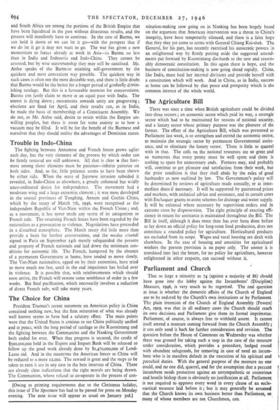Parliament and Church
That so large a' minority as 74 (against a majority of 86) should have gone into the lobby against the Incumbents' (Discipline) Measure, 1946, is very much to be regretted. The real question at issue is whether the domestic affairs of the Church of England are to be ordered by the Church's own institutions or by Parliament The plain intention of the Church of England Assembly (Powers) Act, 1919, was that in all ordinary cases the Church should reach its own decisions and Parliament give them its formal imprimatur. Parliament, of course, is always free to withhold assent. It cannot itself amend a measure coming forward from the Church Assembly ; it can only send it back for further consideration and revision. The question before the House of Commons on Wednesday was whether there was ground for taking such a step in the case of the measure under consideration, which provides a procedure, hedged round with abundant safeguards, for removing in case of need an incum- bent who is in manifest default in the execution of his spiritual and parochial duties. With the general purpose of the measure no one could, and no one did, quarrel, and for the assumption that a peccant incumbent needs protection against an unsympathetic or censorious and hostile bishop there is obviously no justification at all. Parliament is not required to approve every word in every clause of an eccle- siastical measure laid before it ; but it may generally be assumed that the Church knows its own business better than Parliament, so many of whose members are not Churchmen, can.






























 Previous page
Previous page